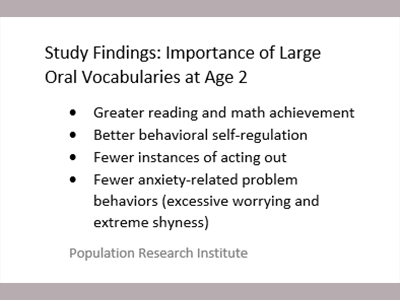Children with larger oral vocabularies by age 2 arrived at kindergarten better prepared academically and behaviorally than their peers, according to a new study by researchers at Pennsylvania State University, the University of California, Irvine and Columbia University.
Researchers tested students’ proficiency in early reading and math skills to measure academic achievement; behavioral skills were measured by teacher ratings on specific behaviors including acting out, difficulty concentrating and physical aggression.
The study analyzed data representing 8,650 children across the U.S. in the Early Childhood Longitudinal Study-Birth Cohort.
Said researcher Paul Morgan, associate professor of education of Penn State: “Our findings provide compelling evidence for oral vocabulary's theorized importance as a multifaceted contributor to children's early development.”
Prior studies have documented vocabulary gaps and linked vocabulary skills of young children to later life success. What makes this study unique is that it directly links vocabulary gaps to academic and behavioral outcomes in kindergarten and its substantially larger sample size than previous surveys.
In 1995, Betty Hart and Todd Risley released their research The 30 Million Word Gap by Age 3 which identified the difference in the number of words young children were exposed to between birth and 4-years-old in relation to their parents’ income. Parental income was split into three groups: professional, working-class and welfare. The study also noted significant differences in parental affirmations and prohibitions dependent on income groups.
Stanford University professor Anne Fernald expanded on Hart and Risley’s research in 2013 when she found that the vocabulary gap can be seen as early as age 18 months and gaps in language processing skills by age 2.


